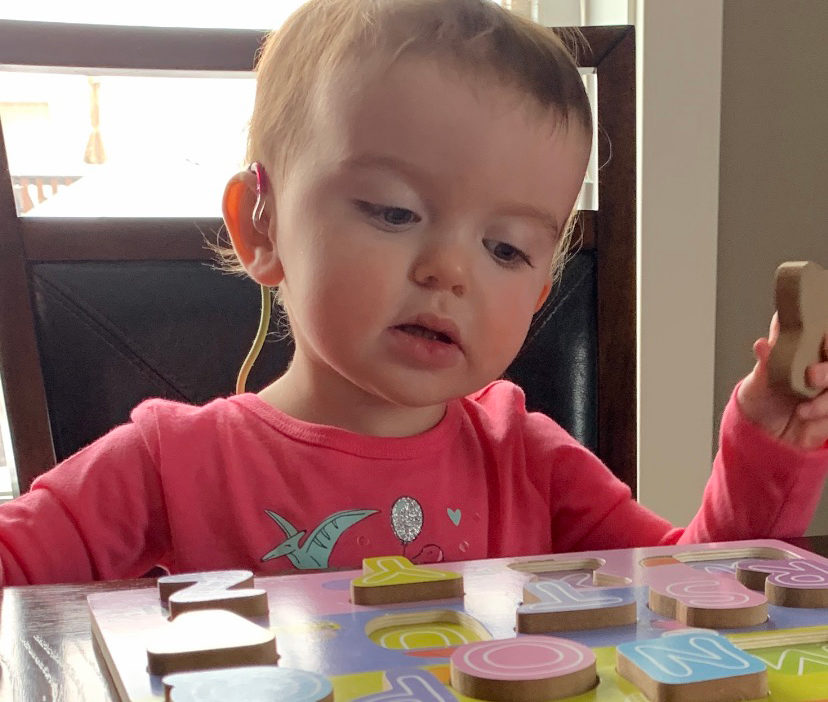
– Photo by provided by Bailey Carter
Wembley mom, Bailey Carter, was in denial. Her daughter, Lilah, was only one-week-old and she had just failed a hearing test.
“At first, I didn’t believe it because [I thought] she responds to me. I think a lot of parents don’t want to believe there is anything wrong or anything different [with their child], especially when they are not really showing any signs,” said Carter, who lives about 20 minutes west of Grande Prairie.
Lilah is one of thousands of babies across the province who received the hearing screening shortly after birth through Alberta’s Early Hearing Detection and Intervention (EHDI) Program. The initiative was rolled out province-wide in 2018 through Alberta Health and Alberta Health Services (AHS).
Early intervention began shortly for Lilah after further testing revealed she had mild-to-moderate bilateral (in both ears) hearing loss. Today, the two-and-a-half-year-old proudly wears her hearing aids on both ears, and, coupled with recommended strategies to enhance hearing and language learning opportunities, keeps her on par with children of the same age.
“We want to catch those infants [who] have permanent congenital hearing loss,” said Haley Campbell, a registered audiologist at AHS’s Edson clinic. Identifying hearing loss as early as possible is important so children can stay on track with their peers for speech, language development, and learning, she noted.
The free screening is non-invasive and works best when babies are relaxed, content, or sleeping. A specially trained hearing screener gently inserts a soft rubber tipped sensor into each ear.
An otoacoustic emission instrument then measures how the cochlea, or inner ear, responds to the soft, rapid clicking sound that occurs through the sensor by making a corresponding sound back through the ear canal, said Campbell.
Although the test usually takes less than two minutes, the screening can possibly provide valuable information on hearing loss before significant brain development occurs.
“It was nice to have that sort of insight into what she actually hears.”
– Bailey Carter
Carter said it was difficult at first to comprehend that her daughter had hearing loss. She now appreciates the availability and value of early screening close to home, and is thankful that it was caught at such a young age.
“I feel good knowing this early because I know that I’m doing … as much as I can to make sure that she can get the best that she can in life … A lot of kids have to catch up.”
It’s critical to get support in place early, said Dalique van der Nest, AHS Executive Director, North Zone’s Allied Health and Volunteer Resources based in Slave Lake.
“The fact that we could actually get them screened by a month, get diagnosed by three months, and then actually give them the intervention that they need by six months is a huge step in their life,” she said.
“[Permanent hearing loss] is actually one of the most common congenital conditions that you can find in a newborn.”
In 2019, 82 per cent of the babies born in Alberta were screened and 61 of them were confirmed to have permanent congenital hearing loss. The same year, 3,896 babies were tested at North Zone facilities.
Many communities in the North Zone, with more than 200 births annually, offer newborn screening at a local health-care centre, said van der Nest.
Twelve screening sites are located across Northern Alberta including Bonnyville (a Covenant Health site) in the east to Hinton in the west, and as far north as High Level, as well as larger centres such as Fort McMurray, and Grande Prairie.
Van der Nest said locally qualified screeners make it easy for rural residents to have their children tested without requiring a long trip to a larger centre.
Ideally, a baby’s hearing should be screened within one month of birth—even as early as 15 to 20 hours after delivery—with the quick and painless test at the health-care centre, she said. Screening is important, as without it, there are no obvious signs at an early age to tell if an infant has hearing loss.
Hearing is critical to the development of spoken language during the early years when children’s brains are developing, said Campbell.
Having intervention supports in place early for children with permanent hearing loss, such as audiology and speech-language pathology, helps parents develop an understanding of what their child needs to develop for optimal language, reading, and social skills.
“They played a simulation of what [Lilah’s] hearing was [like with] what she can and can’t hear … It was kind of eye opening,” said Carter.
“It was nice to have that sort of insight into what she actually hears.”
Visit ahs.ca/ehdi to learn more about Alberta’s EHDI Program.
– Lorena Franchuk
Did you enjoy this article?
Subscribe to the Rural Health Beat to get a positive article about rural health delivered to your inbox each week.
Oops! We could not locate your form.
